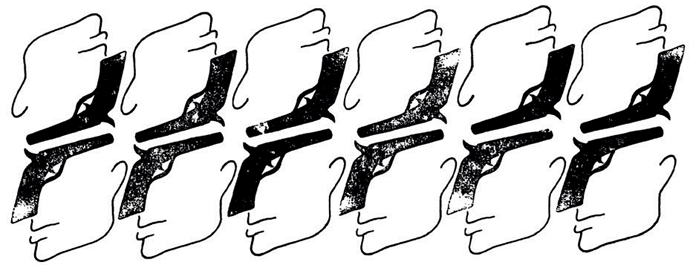Just over an hour after he had been threatened with assassination in Sacramento, President Ford spoke about the troubling rise in crime in the United States. The little of his remarks that were quoted in the newspapers suggested that the president contented himself with platitudes. “Peace on Tenth Street in Sacramento,” he said, “is as important to the people who walk and work there as peace in the Sinai Desert”; “one man or woman or child becomes just as dead from a switchblade slash as from a nuclear missile blast”; “the billions of dollars spent at all levels of government since 1960 have not done the job,” et cetera.
The president had looked into the barrel of a pistol and seen the nearness of his own death, but he apparently failed to understand that he also had seen a magical transformation. With a single gesture, a deranged girl named Lynette Fromme, aged twenty-six and dressed in the red robe of an imaginary religious order, had become a national celebrity. Within a matter of hours it became necessary to know about her unhappy childhood, about her belief in “the people’s court of retribution,” about her squeaky voice and her devotion to the murderous fantasies of Charles Manson.

Illustration by Elizabeth Van Itallie, which appeared in the September 1978 issue of Harper’s Magazine
The present admiration of the criminal no doubt arises from what sociologists would describe as a condition of alienation. If the state can be perceived as a hostile abstraction, and if too many people cannot conceive of a nation held together by a common idea of justice, then we must make do with the primitive loyalties of the Mafia. The collective glamorization of organized crime seems to me analogous not only to the psychotic fantasies of the Manson family but also to the wistful longings of those intellectuals who wish that the world could be restored to the spiritual purity of the late Middle Ages. I can understand the desire for simplification, but the celebration of the criminal is a confession of defeat. The predatory mode of doing business depends upon the equation of something for nothing: draw the three of diamonds and live happily ever after; steal another man’s invention and sell it into the mass market; borrow from the government and let the next generation pay the debt.
All well and good, and maybe even successful, but to what purpose? If I think of the thieves and confidence men whom I have met, I remember the boredom in their eyes and their lack of interest in anything beyond the next day’s scam. Contrary to popular report, the criminal mind is remarkably dull. Because it believes in nothing, it doesn’t take the time or the trouble to make anything of value—not families, books, laws, nor civilizations. The grand predators come and go like so many lizards in the desert, killing and feeding and leaving nothing to their heirs except a tape-recorded conversation with David Frost.
No doubt it is unfair to expect President Ford to think of such things at the moment when Squeaky Fromme pointed a gun at him. One virtue of the politician is his willingness to learn slowly, changing his opinion to conform with the opinions held by a majority of his constituents, but unless Ford learns to recognize his enemies in all their personae, he must bear the constant risk of assassination. Some people might say that a president accepts such a risk with his office, that he is a brave man for doing so, that he should be congratulated for the risk, which he also imposes on everybody else in the country. Possibly true, but it is the courage of lost causes and inevitable defeats, the courage of the man who prefers to die with his stupidity rather than try to find a way out of the desert. The newspapers gave the distance between the president and Manson’s “main lady” as two feet, but the distance in time was much greater. It was the distance between the Neolithic hunt and the articles of the American Constitution, between the ritual sacrifice of the Aztecs and the science of celestial navigation. The distance is worth preserving, but it is a difficult thing to do in a society that makes celebrities of the people who would destroy it.
From “The Assassin as Celebrity,” which appeared in the November 1975 issue of Harper’s Magazine.
























































































